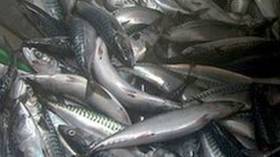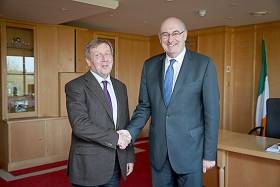Displaying items by tag: Michael Creed
Budget Provision for New Marine Institute Research Vessel
In the budget, Marine Minister Michael Creed has made provision for the Department’s Seafood Programme to increase by €5 million, to a total of €137.8 million.
The provision, says Creed, will help fund vital investment in our fishery harbours, most particularly in Killybegs, Howth and Castletownbere.
The budget provision will allow the Marine Institute to progress the construction of a new €50 million modern research vessel. This will provide critical national infrastructure to enable Ireland to address the considerable challenges of Brexit and the Common Fisheries Policy as well as climate-induced impacts on our oceans.
Marine Minister Meets French Counterpart in Paris
Minister for Agriculture Food & Marine, Michael Creed TD, this morning (Thursday) met with his French counterpart, Stephane Travert, in Paris. This is the fifth in a series of bilateral meetings being conducted by the Minister with EU counterparts on the implications of Brexit for the agri-food and fisheries sectors and the future of the Common Agricultural Policy, and follows on from his meeting yesterday [Wednesday] in Berlin with the German Minister for Food and Agriculture, as well as recent meetings with his Dutch, Danish and Austrian counterparts.
Commenting on this morning’s meeting, Minister Creed said; “I was delighted to have the opportunity to further deepen my relationship with Minister Travert, and to update him on the current position on Brexit from an Irish perspective. It was also helpful to listen to the concerns of the French Government in relation to Brexit and to add to our understanding of the level of preparedness amongst EU colleagues. This will be reinforced through further practical cooperation at official level on technical issues over the coming period.”
The Minister added; “France, similar to Ireland, has a significant agri-food exposure to the UK market and therefore shares many of the same concerns. It is also, like Ireland, fully supportive of the EU approach to Fisheries in the Brexit negotiations.”
The Ministers also exchanged views on the European Commission’s proposals in relation to the Multiannual Financial Framework for the post-2020 period, and expressed concerns on the potential impacts of some of the proposals around the budget of the Common Agricultural Policy post-2020 contained in the MFF.
Minister Creed continued; “as significant producers and exporters of food products, Ireland and France have traditionally adopted similar positions when it comes to the importance of the CAP and, in turn, its funding. This continues to be the case, and today we discussed our shared determination to ensure a properly resourced CAP in order to deliver on environmental and climate change objectives whilst also supporting the challenges facing farmers in terms of low incomes, market price volatility, competitiveness and generational renewal.”
The Ministers also had a brief exchange on the current position in relation to EU trade negotiations with various partners, and their potential impact on the EU agriculture sector. On this, as on the other issues discussed, there was agreement on the need to work together to ensure that the interests of the European agri-food sector are protected.
Minister Creed also extended an invitation to Minister Travert to visit Ireland and see first-hand the potential implications of Brexit on the agri-food and fisheries sector.
233,500 Tonnes of Fish Quotas, Worth €280m for Irish Fishermen for 2017
The Minister for Agriculture, Food and the Marine, Michael Creed T.D., today secured 233,500 tonnes of quotas worth €280 million for Irish fishermen for 2017. This represents an increase of 17,390 tonnes over 2016. The Minister secured the deal in the early hours of Wednesday morning following two days of intensive negotiations at the annual Fisheries Council in Brussels.
Commenting on the Commission package agreed by Member States, including Ireland, the Minister said “This is a balanced package for the Irish fishing industry. I am satisfied that I have managed to turn an extremely worrying set of proposals from the Commission into a much improved outcome for the Irish fishing industry. I am especially pleased that the quotas agreed respects the scientific advice ensuring that the fish stocks in our waters will be managed sustainably.”
The Minister said "The total €280m value of quotas, which represents a 6% increase on 2016, is a good result overall and is a long way from the original Commission proposals which would have resulted in very significant losses to our fleet. The original proposal included a 19% reduction in whitefish quotas.”
The Minster said "I am particularly pleased to have persuaded the Commission to reverse the proposed 9% cut in the prawn quota, the most important fishery for the whitefish fleet. We succeeded in getting the Commission to apply the appropriate scientific advice for prawns resulting in a 9% increase. This was my number one priority heading into these negotiations and I am very happy with the result”.
The specific quota details negotiated by Minister Creed include:
For the South and West coasts and the Irish Sea, a 9% increase in the €74 million prawn fishery which benefits the ports of Clogherhead, Howth, Union Hall, Castletownbere, Dingle and Ros a Mhil.
For the South West, a 9% increase in hake, reversal of cuts proposed for monkfish - important for the southern ports of Castletownbere and Dingle.
For the Celtic Sea fisheries: 21% increase in whiting (from a possible 27% cut); 7 % increase in haddock, 15% cut in cod (reduced from the 68% proposed cut).
For the Irish Sea, a 25% increase in haddock; retention of cod and sole quotas.
In the North West, a 20% increase in monkfish quota; a 9% increase for the megrim quota, a near doubling of the Rockall haddock quota and no change in whiting benefiting the ports of Greencastle and Killybegs.
Cuts in line with scientific advice were applied to haddock in the North West and megrim in the Celtic Sea.
The Minister explained "The most difficult area coming into these negotiations was the Commission proposal for cod and whiting in the Celtic Sea. The proposal was for a -68% cut on cod and a -27% cut in whiting. Whilst the scientific advice on cod in the Celtic sea is worrying, the scientific advice on whiting in the Celtic sea is positive. I am satisfied that the final outcome of a -15% cut in the cod quota and a 21% increase in the whiting quota was the most positive that could have been achieved. The impact of the cut in cod quota for Ireland, is substantially reduced through the application of the Hague Preferences*”.
On Mackerel, the Minster said that “Overall I am very satisfied with the increase in the quota allocation for our single most valuable fishery, Mackerel, which will have a value of €86m in 2017.
Minister Creed concluded "In 2017 we will now have a significant increase for our vitally important whitefish fisheries and stability for many of our valuable stocks around our coast. This will ensure the continued vibrancy of our industry and the long term sustainability of our stocks”.
Irish Mackerel Quota for 2017 Increased by Over 10,500 Tonnes
Minister for Agriculture, Food and the Marine Michael Creed TD today welcomed the positive outcome for Irish Fishermen at the international fisheries negotiations which concluded today at the National Seafood Centre in Clonakilty, Co. Cork. These negotiations, between the European Union, Norway, the Faroe Islands, Iceland and Greenland were focused on the management of the €1billion annual mackerel fishery in the North East Atlantic.
The new mackerel quota for Irish fishermen for 2017 will be 86,429 tonnes - an increase of over 10,500 tonnes from 2016.
Minister Creed said:
“Mackerel is our most valuable fishery and allied to the fact that we are the second largest EU quota holder these negotiations are of crucial importance to the Irish fishing industry. In that context, I very much welcome the outcome of the international mackerel negotiations today, hosted by Ireland, in which Irish fishermen will now have over 10,500 tonnes more in 2017. This is worth over €10million directly to our catching sector with further value to be added by our mackerel processing factories in Donegal, Galway, Kerry and Cork”.
The current sharing arrangement for mackerel was agreed in 2014 between three parties only – EU, Faroes and Norway. An amount is held in reserve to accommodate the other parties. This agreement is due to expire in 2018 and it is expected that negotiations on a new agreement will commence in 2017.
The Minister added that:
“The quotas agreed for 2017 are consistent with the Long term Management Strategy agreed by the parties last year to provide sustainability and stability in this hugely valuable fishery in line with the scientific advice. Industry representatives, in particular, Sean O’Donoghue of the Killybegs Fishermen’s Organisation, Patrick Murphy of the Irish South & West Fishermen’s Organisation and Francis O’Donnell of the Irish Fish Producers Organisation were very helpful to the Irish negotiating team, throughout the negotiations .”
Marine Minister Creed Meets Commissioner Phil Hogan
The Minister for Agriculture, Food and the Marine, Michael Creed TD, met European Commissioner for Agriculture and Rural Development, Phil Hogan, this evening for the first time since the Minister’s appointment.
The Minister and Commissioner for Agricultre and Rural Development took the opportunity to informally review current issues.
Commenting after the meeting, the Minister said: “I was determined to have this early engagement with Commissioner Hogan, which served as a very useful opportunity for me to outline the Irish Government priorities for the European agenda over the coming months and for us to establish a solid basis for our future working relationship.
Commissioner Hogan said: “I was pleased to meet Minister Creed and I wish him every success in his new role. This is a challenging time for the sector and constructive engagement between all policymakers is essential'



























![Minister Creed today [3rd May] met his French counterpart Stephane Travert, in Paris. Pictured along with Ministers Creed and Travert (centre) are Patricia O'Brien (left), Irish Ambassador to France, Catherine Geslain-LanÈele, Director General in Ministry for Agriculture, France and Aidan O'Driscoll, Secretary General, DAFM](/media/k2/items/cache/65698bb86e8c317b4aa329aef7816be2_Generic.jpg)




































